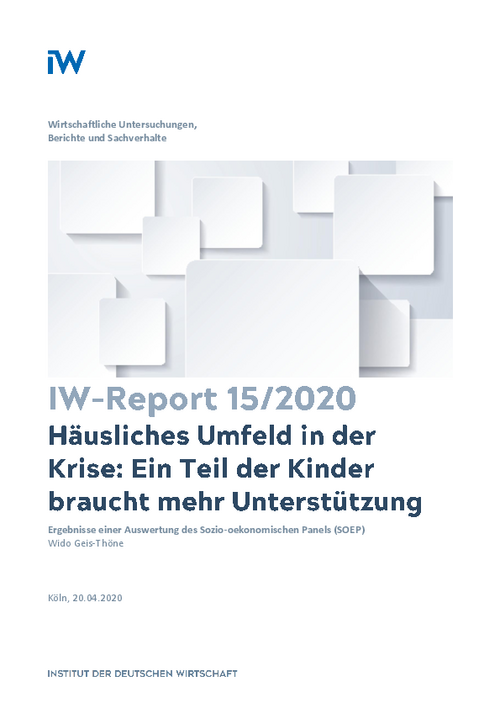In the Corona crisis, the domestic living environment has become increasingly important for the activity and development opportunities of children in Germany. In most cases, the situation is good, as shown by an own evaluation of the Socio-Economic Panel (SOEP).

Domestic Environment During the Crisis: Some of the Children Need More Support
IW-Report

In the Corona crisis, the domestic living environment has become increasingly important for the activity and development opportunities of children in Germany. In most cases, the situation is good, as shown by an own evaluation of the Socio-Economic Panel (SOEP).
For example, in 2018, the vast majority of families with children under the age of 16 (80.9 percent) had at least one room (without bathroom, kitchen, etc.) per household member and 51.0 percent had even more than one. About two thirds (66.3 percent) had their own garden or access to a garden. The domestic learning environment, which has become much more important in the context of home schooling, is also good in most cases. 90.0 percent of the 12 years old children had their own desk in 2018 and 89.6 percent had access to a laptop or PC. However, the situation is less favourable in both cases for children from educationally disadvantaged families, families receiving ALGII and families with a migration background.
The social environment of the children at home is more problematic. Almost two thirds (62,2 per cent) of the 12-year-olds had often or very often had an argument with another member of the nuclear family in 2018. Although this affects mostly siblings, a substantial proportion of children (24.1 percent) also regularly quarrel with their parents. This does not mean, however, that relationships in the nuclear families are bad per se. Thus, at 95.5 percent, almost all twelveyear-olds state that they often or very often receive support and help here with the things that are important to them. Nevertheless, schools and day-care centres should be reopened as soon as possible, especially in view of the fact that the double burden of home office and care can quickly lead to parents being overwhelmed (Bardt / Hüther, 2020). If, from an epidemiological point of view, restrictions on the everyday life of families have to remain in place, the small group of children with very unfavourable domestic living conditions should receive special treatment when designing exit strategies. Furthermore, children whose domestic circumstances prevent them from attending home schooling should receive intensive additional support after schools have reopened in order to close the gaps that arise now (Anger / Plünnecke, 2020).

Wido Geis-Thöne: Häusliches Umfeld in der Krise: Ein Teil der Kinder braucht mehr Unterstützung – Ergebnisse einer Auswertung des Sozio-oekonomischen Panels (SOEP)
IW-Report

More on the topic

The Regional Distribution of Graduates in Germany
Graduates in Germany are distributed very unevenly across the country. Taking the population aged between 35 and 44, who have generally already completed their higher education, in 2019 the highest proportions of university graduates were to be found in Berlin ...
IW
The Regional Distribution of Low-skilled Workers in Germany
Low-skilled workers in Germany are heavily concentrated in urban areas. In 2019, the proportion of 25- to 64-year-olds who had not completed at least two years of vocational training or higher education was almost twice as high in cities with a population of ...
IW